Wake Forest to celebrate indigenous people
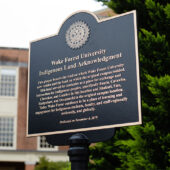 Representatives from the North Carolina Tribal Nations will be on hand as Wake Forest University unveils a plaque honoring the land on which the University now resides and the original campus.
Representatives from the North Carolina Tribal Nations will be on hand as Wake Forest University unveils a plaque honoring the land on which the University now resides and the original campus.Categories: Community Impact, Happening at Wake, Inclusive Excellence

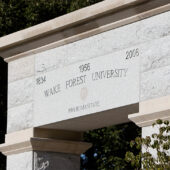 Over the past few years, Wake Forest University has been committed to acknowledging and understanding the role slavery played in its past. In 2016, Wake began taking a deep dive into its history, and in 2017 it joined Universities Studying Slavery (USS), a consortium of colleges and universities that are examining the role slavery played on their campuses.
Over the past few years, Wake Forest University has been committed to acknowledging and understanding the role slavery played in its past. In 2016, Wake began taking a deep dive into its history, and in 2017 it joined Universities Studying Slavery (USS), a consortium of colleges and universities that are examining the role slavery played on their campuses.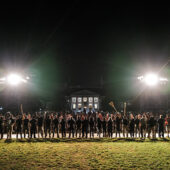 Housekeeping staff, arborists, turf crew members, locksmiths and carpenters were among the nearly 70 participants performing on Hearn Plaza in the original dance piece “From the Ground Up.” Performances were held on Oct. 3, 4 and 5.
Housekeeping staff, arborists, turf crew members, locksmiths and carpenters were among the nearly 70 participants performing on Hearn Plaza in the original dance piece “From the Ground Up.” Performances were held on Oct. 3, 4 and 5.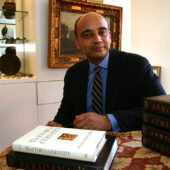 Anthony Appiah, an internationally renowned philosopher and novelist, will speak at Wake Forest through the Eudaimonia Institute’s third Noesis Lecture Series. Appiah’s lecture is sponsored in conjunction with the President’s Office as part of the University’s Voices of Our Time series.
Anthony Appiah, an internationally renowned philosopher and novelist, will speak at Wake Forest through the Eudaimonia Institute’s third Noesis Lecture Series. Appiah’s lecture is sponsored in conjunction with the President’s Office as part of the University’s Voices of Our Time series.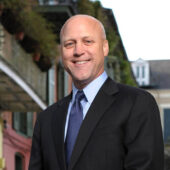 Former Louisiana Lt. Gov. and New Orleans Mayor Mitch Landrieu will speak at Wake Forest as part of the University’s Voices of Our Time series.
Former Louisiana Lt. Gov. and New Orleans Mayor Mitch Landrieu will speak at Wake Forest as part of the University’s Voices of Our Time series.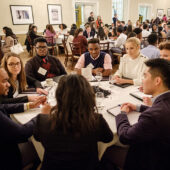 Employers and colleges have parallel challenges. Employers want to bring diverse candidates into their organizations. Colleges want to help these students get there. But, of the nearly 17 million undergraduate college students nationwide, 80% bypass their school’s career centers for advice on networking and finding jobs.
Employers and colleges have parallel challenges. Employers want to bring diverse candidates into their organizations. Colleges want to help these students get there. But, of the nearly 17 million undergraduate college students nationwide, 80% bypass their school’s career centers for advice on networking and finding jobs.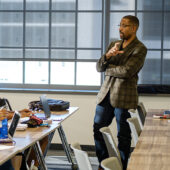 Corey D. B. Walker, a visiting professor of leadership studies and the humanities at the University of Richmond and a former dean at Winston-Salem State University, will deliver the inaugural address for Wake Forest University’s Slavery, Race and Memory Project Lecture Series.
Corey D. B. Walker, a visiting professor of leadership studies and the humanities at the University of Richmond and a former dean at Winston-Salem State University, will deliver the inaugural address for Wake Forest University’s Slavery, Race and Memory Project Lecture Series.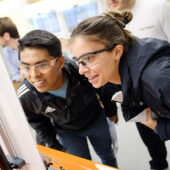 As its first group of engineering students declared their major this year, Wake Forest University achieved something that few, if any, programs have anywhere – a student body that more accurately represents the U.S. population.
As its first group of engineering students declared their major this year, Wake Forest University achieved something that few, if any, programs have anywhere – a student body that more accurately represents the U.S. population.